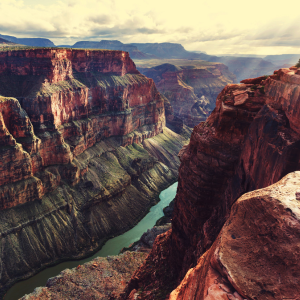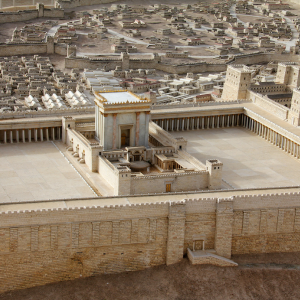Vayeitzei 5783/November 25, 2023- “Yaakov’s Radical Amazement”
Shabbat Shalom. I’d like to relate an experience to you that I’ve experienced several times- most recently on Sam and mine’s trip to Arizona last month. It’s quite similar to what happens to Jacob and the start of our parasha.
The “dad joke” I like to tell is that anything west of New Jersey is “exotic” for me in terms of travel. Born in New York, raised there and in Maryland, now living here for fifteen years (time flies!)- I know my way around the Acela Northeast Corridor. But for our tenth anniversary trip (delayed two years due to COVID), we decided to cross an item off our bucket list and visit Sedona and the Grand Canyon. 
We landed in Phoenix around 10pm, picked up our rental car, and drove to Sedona. It was pitch black and we couldn’t see any of the scenery. We got to our hotel around midnight and immediately went to sleep. We had planned several hikes for when we were there, and the next morning as we drove to the trailhead, our mouths were perpetually open in amazement as we saw the incredible red rock formations. For the next three days we continuously gaped at where we were, which is so unlike anything we have here (no disrespect to our home commonwealth- I love Massachusetts). We took in every sunset, explored many vistas, and spent a great deal outside. It was so therapeutic for both of us, both because we had been overdue for a kids-free vacation, and the events of October 7 were still very present for us, having many friends and family members in Israel.
The Grand Canyon, which was the topper, truly lived up to its name. Anybody been before? We stayed at the south rim, hiked the Bright Angel trail down into the canyon, took a sunset bus tour, and saw more stars in the sky than we’ve seen in a very long time. It was so beautiful that I recited the blessing one says upon seeing the wonders of nature: Baruch atah Hashem eloheinu meleh haolam, oseh ma’aseh v’reishit. “Blessed are you, LORD our God, who does the work of Creation.” We could literally see this work being done, as the Colorado River flows through the canyon and continuously carves into the earth. The following day, after a helicopter tour of the canyon which was truly extraordinary, we drove back to Phoenix, had dinner with a friend I’ve known since childhood, and took the redeye back to Boston. Our trip ended with coffee in the airport at 7:30am. It was an amazing trip, to say the least.
My teacher, Rabbi Art Green, inspired by his teacher Rabbi Abraham Joshua Heschel, calls this feeling “radical amazement”. To stand in wonder and awe at nature, or our most human moments, where we appreciate that we inhabit a sacred space. These moments are especially profound when they occur unexpectedly. At the start of our parasha, Jacob is on the run from his brother Esau. He stops on the way to Haran and famously dreams of a ladder, with angels ascending and descending it. God is present as well and tells him that he and his numerous offspring will inherit this land, to which he will return safely. Waking up from his dream, Jacob utters one of my favorite lines in the Torah: אָכֵן֙ יֵ֣שׁ יְהֹוָ֔ה בַּמָּק֖וֹם הַזֶּ֑ה וְאָנֹכִ֖י לֹ֥א יָדָֽעְתִּי׃
“Surely God is in the place, and I did not know it” (Gen. 28:16).
His amazement continues in the following pasuk (verse): וַיִּירָא֙ וַיֹּאמַ֔ר מַה־נּוֹרָ֖א הַמָּק֣וֹם הַזֶּ֑ה אֵ֣ין זֶ֗ה כִּ֚י אִם־בֵּ֣ית אֱלֹהִ֔ים וְזֶ֖ה שַׁ֥עַר הַשָּׁמָֽיִם׃ “And he was afraid, and said ‘How awesome is this place! This is none other than God’s house, and that is the gateway to heaven’”.
I knew the Grand Canyon lives up to its name, but it was so much more than I expected- so much bigger, so much more beautiful, so much…grander. As Sam and I watched a “Hall of Fame” sunset together, I definitely felt like Jacob did; it was certainly a spiritual experience to witness such beauty, and as I mentioned previously, it was perhaps the first time this fall when I was able to relegate events in Israel to the background of my mind, if only for a little while. We learned that the canyon had been a sacred site for several Native American tribes who made set pilgrimages there as part of their religious tradition- not at all unlike our own pilgrimage festivals, when Jews would go up to Jerusalem and visit the Beit Hamikdash three times a year.
The 12th-century Spanish commentator Ibn Ezra writes of Jacob’s exclamation that the “house of God” refers to any chosen place where a person’s supplications will be answered in their time of need. Ramban and other commentators build on this idea, teaching that Jacob actually is sleeping at the future site of the Beit Hamikdash, which really does become God’s abode during the reign of Solomon. After awakening in fear and awe, Jacob anoints the stone he slept on and names the place where he spent the night Beit El– literally, “the house of God”. God’s location becomes centralized subsequently in the Tanakh– in the mishkan in the desert, then the Beit Hamikdash– but the scenes and effects of God’s handiwork may be felt and observed anywhere. 
Jacob experiences God’s presence at Beit El, and at the end of our parsha, after twenty years spent working for Laban and raising a family in at-times frustrating conditions, he experiences God’s presence again as he departs from Laban for the final time. The angels of God appear to him as he leaves with two wives, two maidservants, one daughter, twelve sons, and many flocks, after coming to Laban with barely more than the clothes on his back. He says after encountering the angels:
“Mahane Elohim zeh”- “this is God’s camp”, and names the place “Mahanaim”, or “camps”.
The Sages teach that Jacob is credited with instituting the ma’ariv service, recited in the evening. Our Etz Hayim humash expands on this idea, positing that the Sages may be crediting Jacob as the first person able to find God in the midst of darkness. In times of travail, as well as times of joy, let us always be attuned to the Shehinah, the divine presence, and realize that our world is indeed imbued with God’s majesty. Whether it’s the Grand Canyon, here in shul, or anywhere else we may go, let us strive to realize that God is wherever we may find ourselves, even if it’s hard to sense. We recite as part of our Shabbat morning service: “V’hashem lo yanum v’lo yishan”- “God neither slumbers nor sleeps”. May we continue to be reminded of God’s everlasting presence, everywhere and at all times. Shabbat Shalom.
*Small edits have been made to reflect the spelling conventions for Hebrew words at Temple Emunah